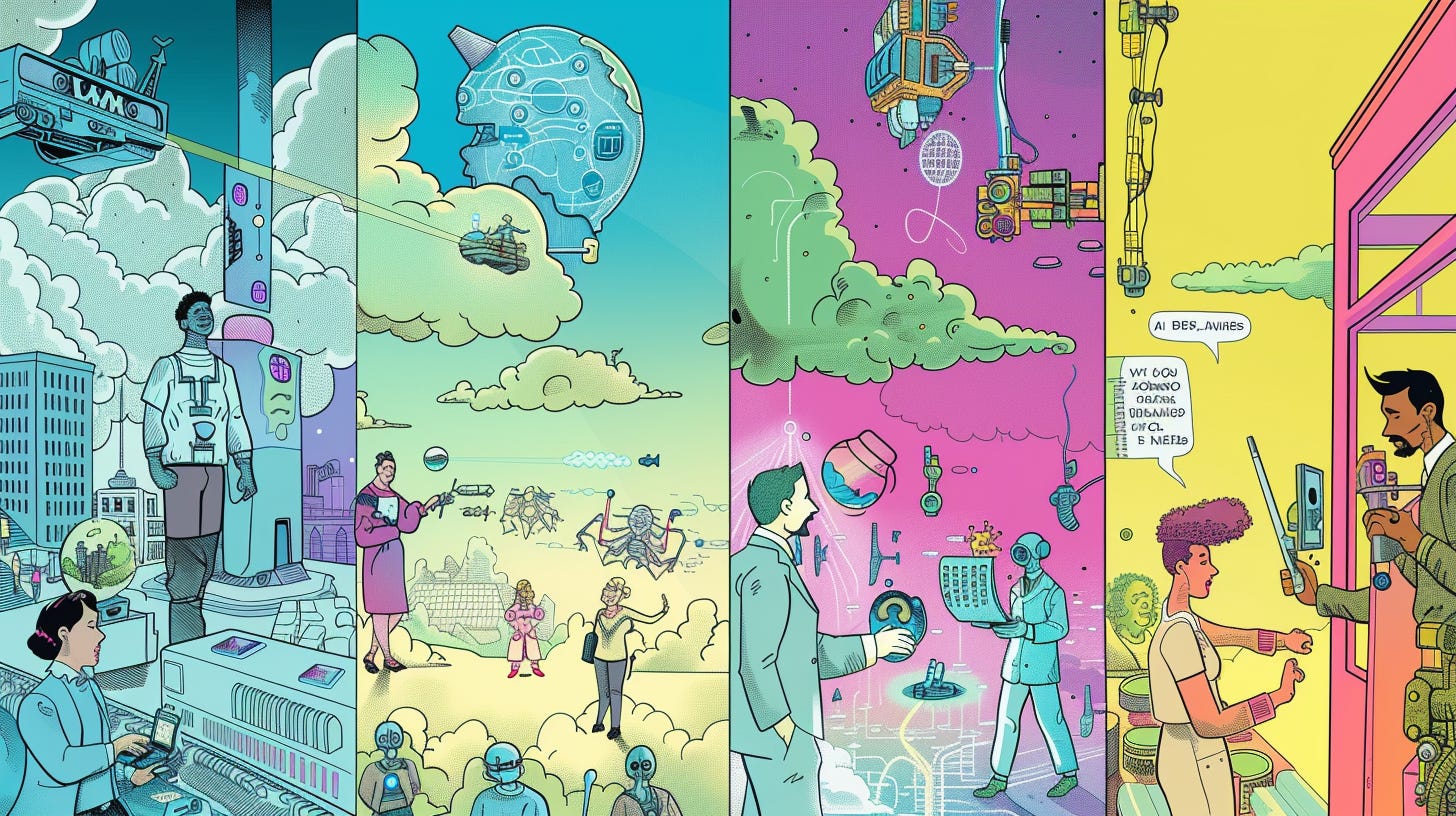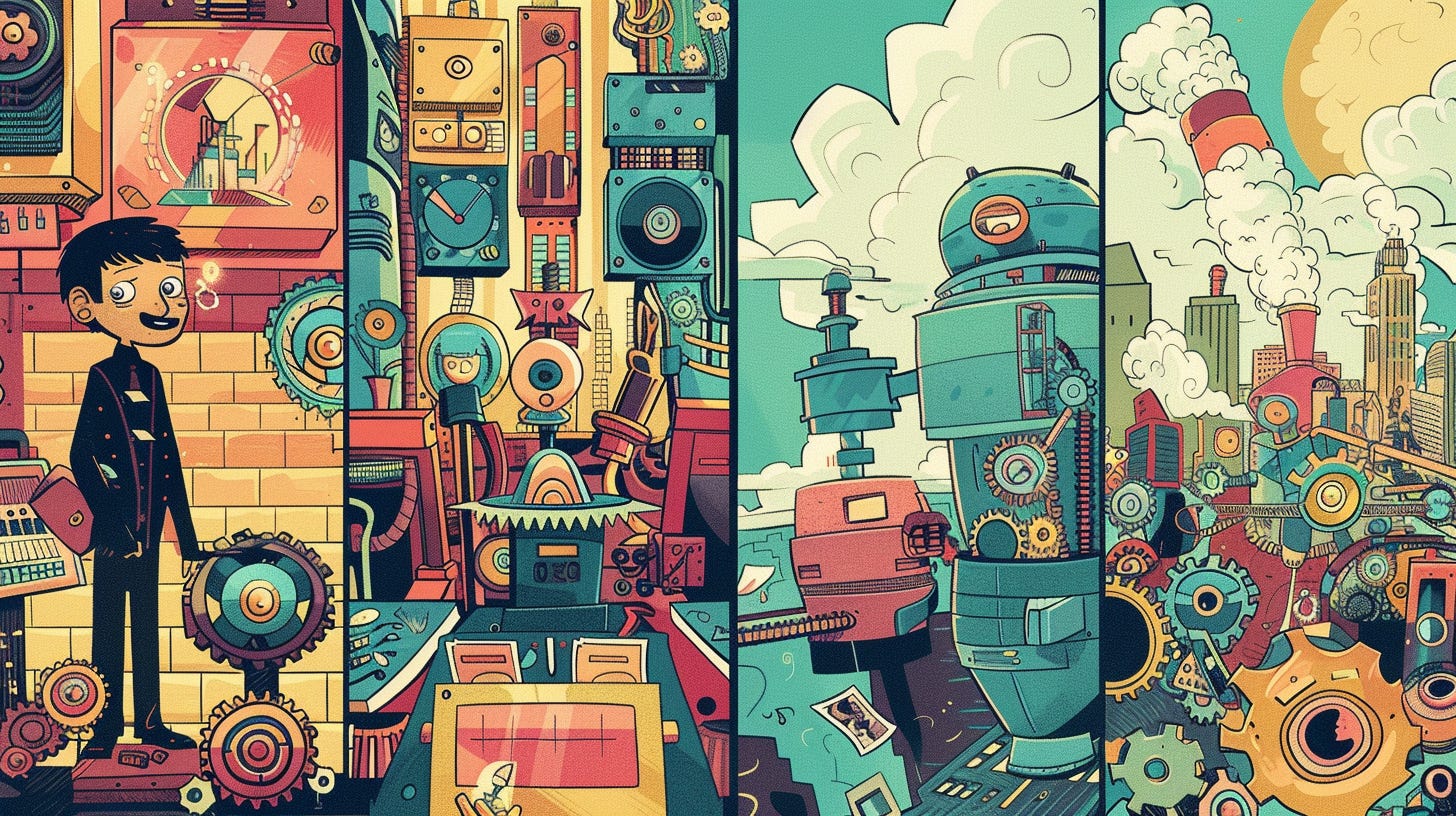In a world increasingly steered by artificial intelligence (AI), it's vital to pause and reflect on the not-so-obvious underpinnings of this technology. As we marvel at AI's ability to reshape healthcare, education, and even our daily decisions, understanding its roots in historical and social contexts becomes crucial. AI isn't just a marvel of engineering; it's a product of centuries of cognitive evolution, deeply intertwined with the ideologies of capitalism and industrialization that emphasize efficiency, predictability, and rational decision-making.
This technological titan, however, brings with it not just advancements but profound ethical dilemmas. It mirrors the biases and inequalities of our societies, often amplifying them under the guise of neutrality. Issues like surveillance capitalism, where personal data becomes a commodity, and the potential displacement of jobs highlight the darker facets of AI integration into corporate and bureaucratic systems. To harness AI's potential responsibly, we need conversations that balance technological progress with core human values like autonomy and dignity.
Economists will tell you: incentives matter. Incentives play a crucial role in shaping behavior, influencing our decisions and actions. They serve as motivators that drive us towards specific goals or outcomes. When incentives are aligned with our individual values, desires, or interests, they can have a significant impact on our choices and actions. In a broader societal context, incentives can be utilized to address various challenges and drive positive change. Policymakers often use incentives to influence behavior related to healthcare, education, or environmental protection. For example, tax incentives can encourage individuals to adopt energy-efficient practices or invest in renewable energy sources.
Which brings us to the reason why AI is clearly so important to corporations and why knowledge workers everywhere are concerned about their jobs: AI is mimicking capacities that are at the core of how corporations and bureaucracies conduct their affairs! The ability to analyze data, adhere to procedures, predict customer behavior, and optimize workflows -- tasks long residing at the core of both bureaucratic and corporate function -- are now steadily being automated through increasingly sophisticated AI systems.
This progression echoes the idealized bureaucratic model outlined by Weber. The promise of AI-powered efficiency, predictability, and cost-cutting directly aligns with the traditional goals of organizational streamlining. The integration of artificial intelligence (AI) into corporate operations has become increasingly significant due to its ability to mimic crucial capacities at the heart of organizational functioning. Tasks such as data analysis, adherence to procedures, predicting customer behavior, and workflow optimization, which traditionally formed the core of bureaucratic and corporate functions, are steadily being automated through advanced AI systems.
This progression resonates with the idealized bureaucratic model proposed by Max Weber, emphasizing efficiency, predictability, and cost-cutting as essential organizational goals. AI-powered systems hold the promise of fulfilling these objectives by automating repetitive and rule-based processes, enabling faster decision-making, reducing operational costs, and enhancing overall productivity. However, the widespread adoption of AI also raises concerns among knowledge workers, who fear that their jobs may become increasingly automated. As AI systems become more sophisticated, tasks that once required human judgment and expertise can now be performed by machines, leading to potential job displacement. This has sparked discussions about the future of work and the need for employees to adapt to the changing demands of the digital economy.
However, it's important to draw on Simon's idea of "bounded rationality." While AI can learn to make decisions based on rules and past experiences, it may struggle to replicate the nuanced judgment and adaptability that humans bring to complex, unpredictable situations. As Simon reminds us, humans rarely act with the pristine rationality assumed by ideal models. The fear isn't simply of replacement by a machine, but displacement by a system designed to mimic the limited aspects of human cognition that mesh seamlessly with bureaucratic or corporate control. Moreover, Zuboff's analysis raises the specter of an AI-driven surveillance capitalism, a world where corporations armed with powerful AI tools have an unprecedented capacity to gather, analyze, and use personal data for profit and manipulation. In their quest for efficiency and control, they will use AI to replace people and be as intrusive as possible into the minds of their users. This erosion of privacy amplifies concerns for knowledge workers. Their expertise, codified into datasets, risks fueling the very systems that may ultimately displace them. It's a scenario where the commodification of intelligence, extended to its logical extreme, creates a profound power imbalance that threatens both livelihoods and the fundamental notion of individual autonomy in an information-driven society.
The fear surrounding AI is not merely about being replaced by machines, but rather the displacement by a system engineered to mimic limited aspects of human cognition seamlessly merging with bureaucratic or corporate control. Furthermore, Shoshana Zuboff's analysis raises concerns about an AI-driven surveillance capitalism, where corporations wield powerful AI tools to gather, analyze, and exploit personal data for profit and manipulation. In their pursuit of efficiency and control, such entities will leverage AI to replace their human workforce and even when they don’t, they will institute surveillance mechanisms that intrude as deeply as possible into workers’ and users' minds. This erosion of privacy amplifies the concerns for knowledge workers. Their expertise, encoded into datasets, runs the risk of fueling the very systems that may eventually displace them. This scenario presents a future where the commodification of intelligence, taken to its logical extreme, creates a profound power imbalance that jeopardizes both livelihoods and the fundamental notion of individual autonomy in an information-driven society. It is a disturbing vision where human intelligence, reduced to a mere commodity, perpetuates a cycle of displacement and control.
Having said that, I am not trying to write a Marxist history of AI, even as I sympathize with that project. The history of artificial intelligence (AI) is a complex and multifaceted one, and it would be impossible to do it justice in a single book. However, it is possible to identify some of the key factors that have contributed to the development of AI, and to explore how these factors have shaped the field.
This section has a different purpose: to show that AI is built on top of a pyramid of cognitive achievements. The first set of achievements is tied to instrumental rationality, including the self-interested economic man who bases his decisions on economic gains and losses. This is a way of thinking that emphasizes the use of practical reason and logic to achieve one's goals. It is a mindset that is often associated with the rise of capitalism and the modern era. The emphasis on instrumental rationality has had a profound impact on the development of AI. AI systems are designed to be rational actors, capable of making decisions based on data and evidence. This is in contrast to human decision-making, which is often influenced by emotions, biases, and limited information.
The second set of achievements is tied to efficiency, predictability and optimization based on data. This is a mindset that is often associated with the rise of industrialization and the modern era. The emphasis on efficiency, predictability, and optimization has had a profound impact on the development of AI. AI systems are designed to be efficient, predictable, and optimal. This is in contrast to human decision-making, which is often inefficient, unpredictable, and suboptimal.
These two achievements did not fall from heaven; they are the outcome of the minds of billions of people co-evolving with the new technologies and social structures of the modern era. The two achievements aren't unrelated; The emphasis on instrumental rationality aligns with the idealized bureaucratic model Weber envisioned, where efficiency and goal-directed behavior are prized above all else. AI, with its ability to optimize processes and identify the most rational courses of action within defined parameters, seems a natural extension of this mindset. Yet, Simon reminds us that "economic man," a purely rational actor, is a theoretical construct. Human decisions are influenced by emotions, biases, and limited information - factors AI often struggles to replicate. This potential mismatch could create unforeseen complexities when AI systems are tasked with decision-making in the unpredictable real world. Zuboff's critique reminds us of the potential dangers when these ideals become the sole focus. The unbridled pursuit of efficiency can lead to dehumanization, while surveillance capitalism threatens to erase boundaries between the public and the commercial. AI, supercharged with unparalleled data-processing capacity, risks amplifying existing tendencies to treat employees and citizens as mere cogs in a machine rather than unique individuals with diverse needs and perspectives.
It's essential to acknowledge that these achievements are not neutral or inevitable. They emerged from specific historical and social contexts. Embedding AI within existing systems without critical examination risks perpetuating their biases and power imbalances. To leverage AI's potential without amplifying its risks, we need a broader conversation about the kind of future we want to build -- one that balances technological progress with human agency, individual autonomy, and social well-being.
The remarkable advancements in artificial intelligence (AI) have revolutionized various aspects of our lives, offering unprecedented opportunities for progress. However, it is crucial to recognize that these achievements are not simply neutral or inevitable outcomes of technological evolution. AI's development is deeply intertwined with the historical and social contexts in which it emerged, and its integration into existing systems must be approached with critical examination. Blindly embedding AI within current systems without proper scrutiny risks perpetuating harmful biases and exacerbating existing power imbalances. Historical injustices and systemic inequities can become embedded in AI systems, leading to unfair or discriminatory outcomes. For instance, AI algorithms used in criminal justice or hiring practices have come under fire for perpetuating racial and gender biases. To mitigate these risks and harness AI's potential for positive impact, a broader, inclusive conversation is needed about the kind of future we want to build. We must engage in a dialogue that balances technological progress with fundamental human values such as agency, autonomy, and social well-being, which should explore questions such as:
How can we ensure that AI systems are developed and deployed in a responsible and ethical manner?
What are the potential long-term societal impacts of AI, and how can we mitigate negative consequences?
How can we create AI systems that augment human capabilities while respecting individual autonomy and dignity?
How can we ensure that AI benefits are equitably distributed, avoiding the creation of a "digital divide"?
There you go! I have solved all the world’s problems.
To summarize, this section was a whirlwind cognitive history of AI, i.e. AI arose out of a series of cognitive achievements that prepared the ground for a mechanical instantiation of the prior era’s cognitive achievements. I will try to make the cognitive framework precise in the next section.










